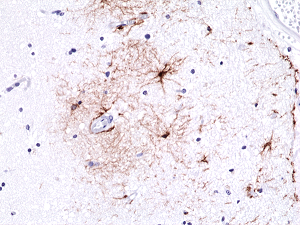anti-GFAP Rabbit Monoclonal (RM246)
| Code | Size | Price |
|---|
| REV-31-1127-00-R100 | 100 ul | £455.00 |
Quantity:
Prices exclude any Taxes / VAT
Overview
Antibody Isotype: Rabbit IgG
Antibody Clonality: Recombinant Antibody
Antibody Clone: RM246
Regulatory Status: RUO
Target Species:
- Human
- Mouse
Applications:
- Immunohistochemistry (IHC)
- Western Blot (WB)
Shipping:
Blue Ice
Storage:
+4°C
Images
Documents
Further Information
Alternate Names/Synonyms:
Glial Fibrillary Acidic Protein
Concentration:
N/A
EClass:
32160000
Form (Short):
liquid
Formulation:
Liquid. 50% Glycerol/PBS with 1% BSA and 0.09% sodium azide.
Handling Advice:
Avoid freeze/thaw cycles.
Immunogen:
A peptide corresponding to the N-terminus of human GFAP.
Long Description:
Recombinant Antibody. This antibody reacts to human and mouse GFAP (Glial fibrillary acidic protein). Applications: WB, IHC. Source: Rabbit. Liquid. 50% Glycerol/PBS with 1% BSA and 0.09% sodium azide. GFAP (Glial fibrillary acidic protein) is a member of the class III intermediate filament protein family. GFAP is expressed in the central nervous system in astrocyte cells. It is involved in many important CNS processes, including cell communication and the functioning of the blood brain barrier. GFAP is heavily and specifically expressed in astrocytes and certain astroglia of the central nervous system, in satellite cells of peripheral ganglia, and in non-myelinating Schwann cells of peripheral nerves. In addition, neural stem cells strongly express GFAP. GFAP is closely related to the other three non-epithelial type III IF family members, vimentin, desmin and peripherin, which are all involved in the structure and function of the cell?s cytoskeleton. GFAP is thought to help to maintain astrocyte mechanical strength as well as the shape of cells. GFAP is used as a marker to distinguish astrocytes from other glial cells during development. Mutations in this gene cause Alexander disease, a rare disorder of astrocytes in the central nervous system. Alternative splicing of the GFAP gene results in multiple transcript variants encoding distinct isoforms. In addition, many types of brain tumor, presumably derived from astrocytic cells, heavily express GFAP.
NCBI, Uniprot Number:
P14136
Package Type:
Vial
Product Description:
GFAP (Glial fibrillary acidic protein) is a member of the class III intermediate filament protein family. GFAP is expressed in the central nervous system in astrocyte cells. It is involved in many important CNS processes, including cell communication and the functioning of the blood brain barrier. GFAP is heavily and specifically expressed in astrocytes and certain astroglia of the central nervous system, in satellite cells of peripheral ganglia, and in non-myelinating Schwann cells of peripheral nerves. In addition, neural stem cells strongly express GFAP. GFAP is closely related to the other three non-epithelial type III IF family members, vimentin, desmin and peripherin, which are all involved in the structure and function of the cell?s cytoskeleton. GFAP is thought to help to maintain astrocyte mechanical strength as well as the shape of cells. GFAP is used as a marker to distinguish astrocytes from other glial cells during development. Mutations in this gene cause Alexander disease, a rare disorder of astrocytes in the central nervous system. Alternative splicing of the GFAP gene results in multiple transcript variants encoding distinct isoforms. In addition, many types of brain tumor, presumably derived from astrocytic cells, heavily express GFAP.
Purity:
Protein A purified.
Source / Host:
Rabbit
Specificity:
This antibody reacts to human and mouse GFAP (Glial fibrillary acidic protein).
Transportation:
Non-hazardous
UNSPSC Category:
Primary Antibodies
UNSPSC Number:
12352203
Use & Stability:
Stable for at least 1 year after receipt when stored at -20°C.



